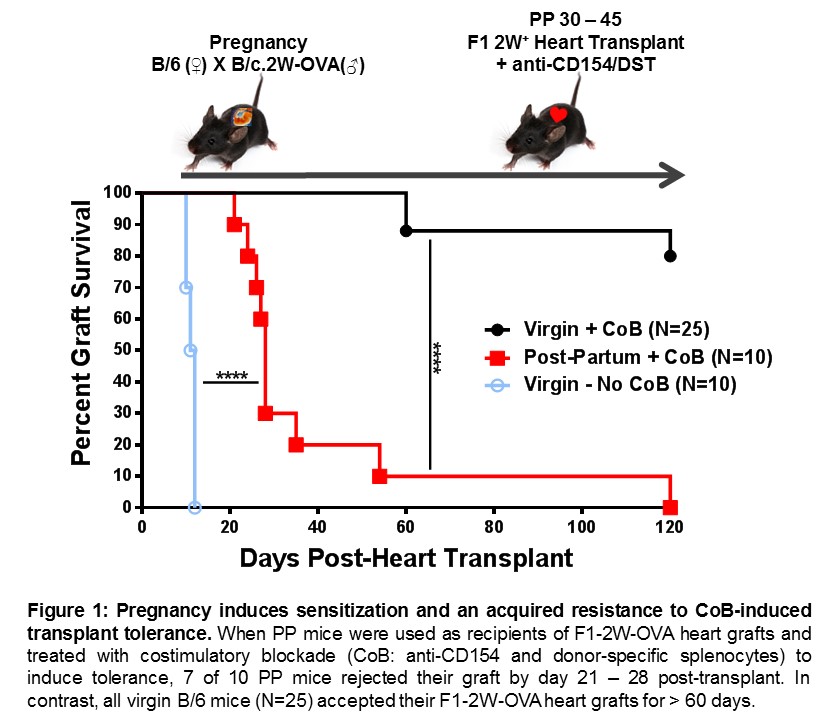Induction of Sensitization and Resistance to Transplant Tolerance by Allogeneic Pregnancy.
1Department of Surgery, University of Chicago, Chicago, IL
2Department of Medicine, University of Chicago, Chicago, IL
Meeting: 2017 American Transplant Congress
Abstract number: 205
Keywords: Pregnancy, Sensitization, Tolerance
Session Information
Session Name: Concurrent Session: Basic Transplant Tolerance I
Session Type: Concurrent Session
Date: Monday, May 1, 2017
Session Time: 2:30pm-4:00pm
 Presentation Time: 2:30pm-2:42pm
Presentation Time: 2:30pm-2:42pm
Location: E350
Background: Clinical data suggest allogeneic pregnancy is a sensitizing event; yet, recent data from mouse models suggest it induces fetal-specific regulatory T cell (Treg) expansion and differentiation into memory Tregs that mediate systemic, fetal-specific immune regulation post-partum (PP). In this study, we sought to define the immunological consequences of allogeneic pregnancy for the induction of allograft tolerance in mice.
Methods: Virgin female B/6 mice were mated with male B/c-2W-OVA transgenic mice and conception date was confirmed with copulation plug visualization. Fetal-specific CD4+ and CD8+ T cell responses were tracked PP using 2W:I-Ab and OVA:Kb tetramers, and fetal-specific antibodies were monitored using B/c targets and flow cytometry. At PP day 30–45, F1 (B/6 x B/c)-2W-OVA heart transplants were performed and recipients were treated with anti-CD154 (POD 0, 7, 14) and donor-specific splenocytes (POD 0) to induce tolerance. Graft rejection was determined by direct palpation.
Results: PP females demonstrated a fifteen-fold increase in total number of fetal-specific Tregs and seven-fold increase in number of fetal-specific conventional CD4+ and CD8+ T cells (Tconvs) at PP day 30–45, compared to virgin controls. 2W:IAb CD4+ Tconvs showed modestly increased expression of markers of anergy (CD44+FR4+CD73+: 20% PP vs 6% V) and OVA:Kb CD8+ Tconvs markers of exhaustion (PD-1: 10% PP vs 0% V). Fetal-specific antibodies increased throughout pregnancy to a peak three-fold increase by PP day 30–45. 7 of 10 PP mice rejected their heart graft by day 21–28 post-transplant, while all virgin mice (N=25) accepted their grafts for > 60 days (Fig 1).
Conclusion: Despite sustained expansion of maternal FoxP3+ Tregs with fetal/allograft-specificity and acquisition of Tconvs with an anergic/exhausted phenotype, allogeneic pregnancy induced fetal-specific antibodies and a resistance to transplant tolerance.
CITATION INFORMATION: Suah A, Young J, Hsu-Wei Khiew S, Wang Q, Yin D, Alegre M.-L, Chong A. Induction of Sensitization and Resistance to Transplant Tolerance by Allogeneic Pregnancy. Am J Transplant. 2017;17 (suppl 3).
To cite this abstract in AMA style:
Suah A, Young J, Khiew SHsu-Wei, Wang Q, Yin D, Alegre M-L, Chong A. Induction of Sensitization and Resistance to Transplant Tolerance by Allogeneic Pregnancy. [abstract]. Am J Transplant. 2017; 17 (suppl 3). https://atcmeetingabstracts.com/abstract/induction-of-sensitization-and-resistance-to-transplant-tolerance-by-allogeneic-pregnancy/. Accessed February 12, 2026.« Back to 2017 American Transplant Congress
